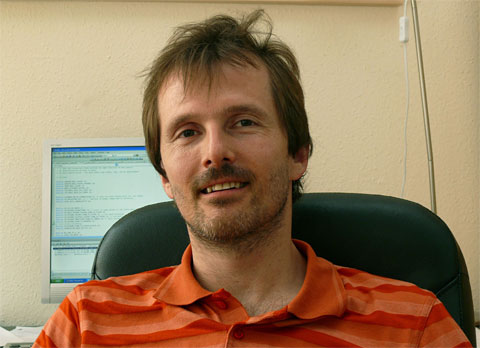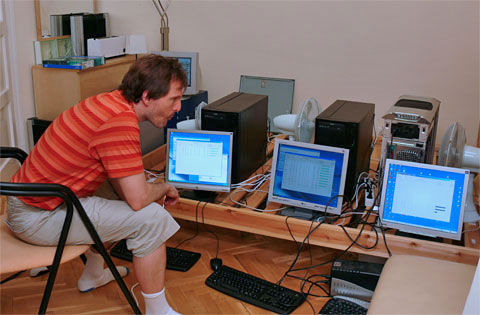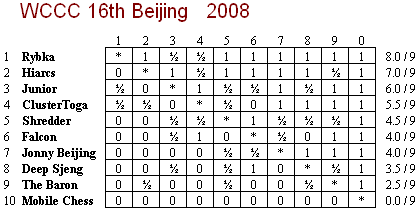The US program Rybka won the 16th World Computer Chess Championship that was held in Beijing, China, a full point ahead of its nearest rival, the British program Hiarcs. Third, a point behind, was the Israeli program Junior, followed by Cluster Toga and then Shredder. The hardware used in the event ranged from a 40-core system to a Nokia cell phone. Final report.
16th World Computer Chess Championship
This tournament was held from September 28th to October 5th 2008 in the Beijing Golden Century Golf Club, Fangshan, Beijing, China. It was part of the Computer Games Championship, with 28 different games like chess, draughts, checkers, Go, backgammon, etc. The final standing in the chess tournament was as follows:
The victory of Rybka was hardly surprising, since this program is dominating the computer rating lists and was running on the most powerful hardware in Beijing. The performance of the British program Hiarcs, the oldest in the field, was very impressive. In the final round Hiarcs beat the German program Shredder, which in the past has won many world championship titles. The Israeli program Junior, also a former world champion, finished a clear point behind Hiarcs in third place. Here a dramatic game from the final round:

Computer Chess World Champion Vasik Rajlich, author of Rybka
The program Rybka is well known to our readers – Version 3 was launched by ChessBase in July this year. It won the 15th World Computer Chess Championship in Amsterdam last year and so was the defending champion in Beijing. Author IM Vasik Rajlich mentions Lukas Cimiotti, who provided some awesome hardware for the event: an overclocked 40-core (5x2x4) Harpertown cluster. "Lukas also spent about two weeks working with me to make sure that everything ran properly," Vasik writes. "We must have had more than 100 phone conversations related to this. For what it's worth, in self-play, the performance of this Rybka configuration seems to be around 100 Elo higher than that of Rybka 3 running on a normal overclocked Skulltrail. The search tree is shaped differently, giving the entity a somewhat different playing style. I find it quite attractive – the play is very precise. There is some food for thought here in the area of normal multi-processor search. Lukas is a regular in the Playchess engine room and no doubt anyone who is curious can learn more there."

Vas Rajlich experimenting with hardware in his Budapest flat
The program Hiarcs (pronounced "high-arks") has a long history. It was originally developed by Mark Uniake (pronounced You-nee-ack) more than twenty years ago, and today it is available on a number of platforms (PC, Macintosh, handheld devices). Hiarcs' playing style is very aggressive, with a distinctive liking for attacking the opponent's king. This often leads to dynamic exciting games which are played on a knife-edge. Hiarcs is written entirely in 'C' and it searches around an order of magnitude less positions per second (average 1,8 million) than most of its competitors. However, it makes up for this apparent slow speed by clever searching and accurate evaluation. The program uses many selective search extension heuristics to guide the search and incorporates a sophisticated tapered search to resolve tactical uncertainties while finding positionally beneficial lines.
Junior is an Israeli program developed as a hobby by Amir Ban and Shay Bushinsky. In 2006 it won the 14th World Computer Chess Championship in Turin, Italy, in 2004 the 12th WCCC in Ramat-Gan, Israel, and in 2002 the 10th WCCC in Maastricht, Holland.
Cluster Toga is a German system running a parallelized version of the program Toga (based on Fruit). The hardware used in Beijing was a 24-core cluster. The German program Shredder, which scored a disappointing 50% in this event, has, like Junior, won multiple world computer chess championships in the past: the 11th WCCC in Graz, Austria, in 2003, and the 9th in Paderborn, Germany, in 1999. Shredder is written in ANSI-C and therefore it can easily compiled on various hardware platforms.
Links
- Official web site
- All the games in PGN
- Hiarcs forum with discussions and pictures
- Rybka Forum, with a lot of discussion on the WCCC, comments by the Rybka team.
- Buy Rybka 3, Deep Rybka 3, Hiarcs 12, Deep Hiarcs 12, Shredder 11, Deep Shredder 11
Prices for Rybka
Multi-processor version: Deep Rybka 3 99.90 Euro Single processor version: Rybka 3 49.99 Euro Rybka 3 Book 24.99 Euro
Note that Rybka 3 includes a database of one million games, and that the purchase of the program entitles you to one year of access to the chess server Playchess.com. Rybka 3 is a UCI engine, with 32 and 64-bit versions included in the package. Rybka can be made the default engine in ChessBase 10.
Article Source : Chessbase
 If you liked the article kindly Digg it, Stumble it, Add to Technorati, bookmark it and please consider subscribing through "Subscribe by Email" and have articles & a Everyman Chessbase eBook delivered right to your inbox! OR "Subscribe to Chess Blog Feed" in a Fead Reader of your choice OR Subscribe to "SMS Alerts" & Get Article Headlines & Updates delivered to your Mobile Phone for free.
If you liked the article kindly Digg it, Stumble it, Add to Technorati, bookmark it and please consider subscribing through "Subscribe by Email" and have articles & a Everyman Chessbase eBook delivered right to your inbox! OR "Subscribe to Chess Blog Feed" in a Fead Reader of your choice OR Subscribe to "SMS Alerts" & Get Article Headlines & Updates delivered to your Mobile Phone for free.Click here to Subscribe to FREE email updates from "Attack The King", so that you do not miss out anything that can be valuable to you !!









0 comments:
Post a Comment